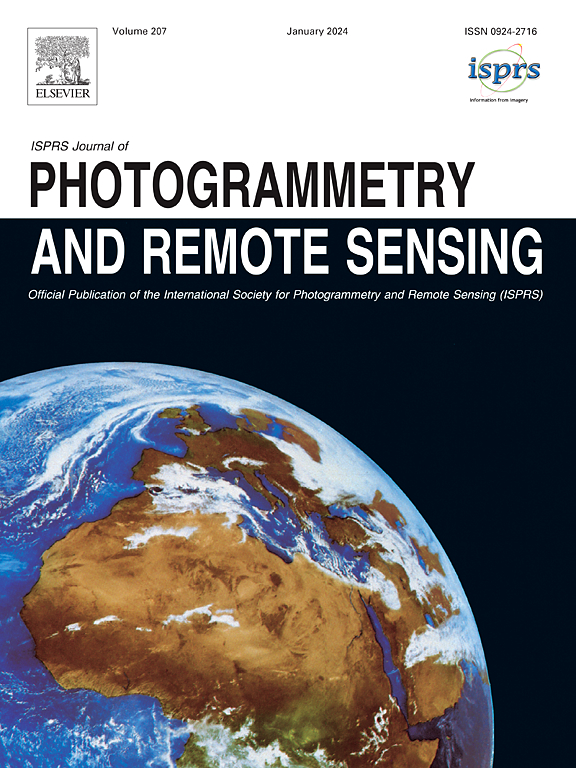Cross-modal change detection using historical land use maps and current remote sensing images
IF 10.6
1区 地球科学
Q1 GEOGRAPHY, PHYSICAL
ISPRS Journal of Photogrammetry and Remote Sensing
Pub Date : 2024-10-24
DOI:10.1016/j.isprsjprs.2024.10.010
引用次数: 0
Abstract
Using bi-temporal remote sensing imagery to detect land in urban expansion has become a common practice. However, in the process of updating land resource surveys, directly detecting changes between historical land use maps (referred to as “maps” in this paper) and current remote sensing images (referred to as “images” in this paper) is more direct and efficient than relying on bi-temporal image comparisons. The difficulty stems from the substantial modality differences between maps and images, presenting a complex challenge for effective change detection. To address this issue, in this paper, we propose a novel deep learning model named the cross-modal patch alignment network (CMPANet), which bridges the gap between different modalities for cross-modal change detection (CMCD) between maps and images. Our proposed model uses a vision transformer (ViT-B/16) fine-tuned on 1.8 million remote sensing images as an encoder for images and trainable ViTs as the encoder for maps. To bridge the distribution differences between these encoders, we introduce a feature domain adaptation image-map alignment module (IMAM) to transfer and share pretrained model knowledge rapidly. Additionally, we incorporate the cross-modal and cross-channel attention (CCMAT) module and the transformer block attention module to facilitate the interaction and fusion of features across modalities. These fused features are then processed through a UperNet-based feature pyramid to generate pixel-level change maps. These fused features are then processed through a UperNet-based feature pyramid to generate pixel-level change maps. On the newly created EVLab-CMCD dataset and the publicly available HRSCD dataset, CMPANet has achieved state-of-the-art results and offers a novel technical approach for CMCD between maps and images.
利用历史土地利用图和当前遥感图像进行跨模式变化探测
利用双时相遥感图像探测城市扩张中的土地已成为一种常见做法。然而,在土地资源调查更新过程中,直接检测历史土地利用图(本文中简称 "图")与当前遥感影像(本文中简称 "影像")之间的变化比依靠双时相影像对比更为直接和有效。困难在于地图和图像之间存在巨大的模态差异,这给有效的变化检测带来了复杂的挑战。为解决这一问题,我们在本文中提出了一种名为 "跨模态补丁配准网络(CMPANet)"的新型深度学习模型,该模型在不同模态之间架起了桥梁,用于地图和图像之间的跨模态变化检测(CMCD)。我们提出的模型使用在 180 万幅遥感图像上微调过的视觉转换器(ViT-B/16)作为图像编码器,使用可训练的视觉转换器作为地图编码器。为了消除这些编码器之间的分布差异,我们引入了特征域适应图像-地图配准模块(IMAM),以快速传输和共享预训练模型知识。此外,我们还加入了跨模态和跨通道注意(CCMAT)模块和转换器块注意模块,以促进跨模态特征的交互和融合。这些融合后的特征通过基于 UperNet 的特征金字塔处理,生成像素级变化图。这些融合后的特征通过基于 UperNet 的特征金字塔进行处理,生成像素级的变化图。在新创建的 EVLab-CMCD 数据集和公开可用的 HRSCD 数据集上,CMPANet 取得了最先进的结果,为地图和图像之间的 CMCD 提供了一种新颖的技术方法。
本文章由计算机程序翻译,如有差异,请以英文原文为准。
求助全文
约1分钟内获得全文
求助全文
来源期刊

ISPRS Journal of Photogrammetry and Remote Sensing
工程技术-成像科学与照相技术
CiteScore
21.00
自引率
6.30%
发文量
273
审稿时长
40 days
期刊介绍:
The ISPRS Journal of Photogrammetry and Remote Sensing (P&RS) serves as the official journal of the International Society for Photogrammetry and Remote Sensing (ISPRS). It acts as a platform for scientists and professionals worldwide who are involved in various disciplines that utilize photogrammetry, remote sensing, spatial information systems, computer vision, and related fields. The journal aims to facilitate communication and dissemination of advancements in these disciplines, while also acting as a comprehensive source of reference and archive.
P&RS endeavors to publish high-quality, peer-reviewed research papers that are preferably original and have not been published before. These papers can cover scientific/research, technological development, or application/practical aspects. Additionally, the journal welcomes papers that are based on presentations from ISPRS meetings, as long as they are considered significant contributions to the aforementioned fields.
In particular, P&RS encourages the submission of papers that are of broad scientific interest, showcase innovative applications (especially in emerging fields), have an interdisciplinary focus, discuss topics that have received limited attention in P&RS or related journals, or explore new directions in scientific or professional realms. It is preferred that theoretical papers include practical applications, while papers focusing on systems and applications should include a theoretical background.
 求助内容:
求助内容: 应助结果提醒方式:
应助结果提醒方式:


